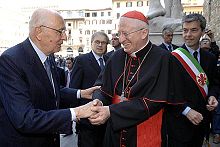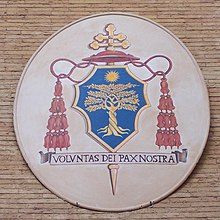Ennio Antonelli
Ennio Antonelli | |
|---|---|
| President Emeritus of the Pontifical Council for the Family | |
 Antonelli in Madrid in 2012. | |
| Church | Roman Catholic Church |
| Appointed | 7 June 2008 |
| Term ended | 26 June 2012 |
| Predecessor | Alfonso López Trujillo |
| Successor | Vincenzo Paglia |
| Other post(s) | Cardinal-Priest of Sant'Andrea delle Fratte (2003–) |
| Orders | |
| Ordination | 2 April 1960 by |
| Consecration | 29 August 1982 by |
| Created cardinal | 21 October 2003 by Pope John Paul II |
| Rank | Cardinal-Priest |
| Personal details | |
| Birth name | Ennio Antonelli |
| Born | 18 November 1936 Todi, Kingdom of Italy |
| Nationality | Italian |
| Denomination | Roman Catholic |
| Previous post(s) |
|
| Alma mater |
|
| Motto | Voluntas dei pax nostra |
| Coat of arms |  |
| Styles of Ennio Antonelli | |
|---|---|
 | |
| Reference style | His Eminence |
| Spoken style | Your Eminence |
| Informal style | Cardinal |
| See | Florence (emeritus) |
Ennio Antonelli (born 18 November 1936) is an Italian cardinal of the Catholic Church and retired President of the Pontifical Council for the Family.
Early life and ordination[]

Born in Todi, he first attended seminary there, and then in Assisi and the Pontifical Lateran University, Rome, where he was awarded a licentiate in sacred theology. He later earned a doctorate in classics at the University of Perugia. He was ordained a priest for the diocese of Todi in 1960.

Bishop[]
He eventually became rector of the Seminary of Perugia and a professor of classics in Assisi before being consecrated a bishop in 1982, when Pope John Paul II named him to head the diocese of Gubbio. In 1988 he was advanced to Archbishop of Perugia-Città del Pieve, from which see he stepped down in 1995 to become Secretary-General of the Italian Episcopal Conference.
Cardinal[]
He served in this position until March 2001, when he was named to the see of Florence, whose archbishop is traditionally named a cardinal, and he was duly elevated in the consistory of 2003, becoming Cardinal-Priest of Sant'Andrea delle Fratte.
He resigned as Archbishop of Florence on 7 June 2008, on becoming President of the Pontifical Council for the Family.[1]
On 29 January 2011 Cardinal Antonelli was appointed a member of the Pontifical Council for the Pastoral Care of Migrants and Itinerants.
Cardinal Antonelli was considered an Italian papabile heading into the 2005 papal conclave in which Pope Benedict XVI was elected and at which Antonelli was a cardinal elector. Cardinal Antonelli is no longer eligible to vote in any future papal conclaves as he turned 80 on 18 November 2016. He retired as president of the Pontifical Council for the Family on 26 June 2012.[2]
On 15 September 2012 he was appointed a member of the Congregation for the Causes of Saints for a five-year term.[3]
He was one of the cardinal electors who participated in the 2013 papal conclave that selected Pope Francis.
On Saturday, 19 July 2014, according to the Vatican web site's daily Bulletin of the Holy See Press Office, where papal appointments are listed, Cardinal Antonelli was appointed by Pope Francis to serve as his Special Envoy to the consecration of the new Shrine of St. Gabriel in Teramo.[4]
Views[]
Cardinal Antonelli is generally seen as a moderate, with a strong interest in social justice and peace issues. In response to demands that the Church denounce divorcees who were candidates for political office in the 1990s, he said the Church should be more concerned with their voting record.[5] When in 2009 the Italian Court of Cassation declared there was no substantial difference in law between a family based on marriage and one resulting from cohabitation, he reacted by saying that, in the light of recent sociological studies that reveal the benefits to society of what is called the traditional family and the disadvantages for society of single-parent families and those of cohabiting couples, the traditional family is needed more than ever today both for family members and for society as a whole.[6]
References[]
This article has an unclear citation style. (May 2019) |
- ^ "Nomina del Presidente del Pontificio Consiglio per la Famiglia" (in Italian). Press Office of the Holy See. 7 June 2008. Retrieved 7 June 2008.[permanent dead link]
- ^ "Rinunce e nomine, 26. giugno 2012" (in Italian). Press Office of the Holy See. 26 June 2012. Archived from the original on 30 August 2012. Retrieved 26 June 2012.
- ^ [1]
- ^ http://press.vatican.va/content/salastampa/it/bollettino/pubblico/2014/07/19/0526/01170.html
- ^ Who Will Be the Next Pope?
- ^ "Archived copy". Archived from the original on 9 April 2013. Retrieved 9 April 2013.CS1 maint: archived copy as title (link)
External links[]
- "Antonelli Card. Ennio". Holy See Press Office. Archived from the original on 4 September 2017. Retrieved 26 November 2017.
- Papabili list for 2009 at "Popes-and-Papacy"
- Profile on Catholic Hierarchy [self-published]
- 1936 births
- Living people
- People from Todi
- 21st-century Italian cardinals
- Roman Catholic archbishops of Florence
- Pontifical Council for the Family
- Cardinals created by Pope John Paul II
- Members of the Pontifical Council for Social Communications
- Members of the Congregation for the Causes of Saints
- 20th-century Italian Roman Catholic archbishops
- Pontifical Roman Seminary alumni
- University of Perugia alumni
- Pontifical Lateran University alumni